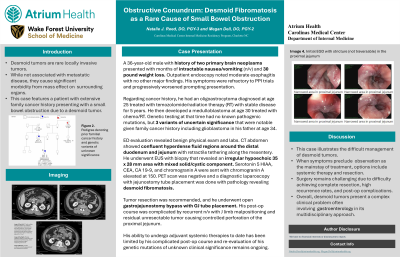Monday Poster Session
Category: Small Intestine
P3249 - Obstructive Conundrum: Desmoid Fibromatosis as a Rare Cause of Small Bowel Obstruction
Monday, October 28, 2024
10:30 AM - 4:00 PM ET
Location: Exhibit Hall E


Natalie J. Reed, DO
Atrium Health
Charlotte, NC
Presenting Author(s)
Natalie J. Reed, DO, Megan Dell, DO
Atrium Health, Charlotte, NC
Introduction: Desmoid tumors are rare locally invasive tumors. While not associated with metastatic disease, they cause significant morbidity from mass effect on surrounding organs. This case features a patient with extensive family cancer history presenting with a small bowel obstruction due to a desmoid tumor.
Case Description/Methods: A 36-year-old male with history of two primary brain neoplasms presented with months of intractable nausea/vomiting (n/v) and 30 pound weight loss. Outpatient endoscopy noted moderate esophagitis with no other major findings. His symptoms were refractory to PPI trials and progressively worsened prompting presentation.
Regarding cancer history, he had an oligoastrocytoma diagnosed at age 25 treated with temozolomide/radiation therapy (RT) with stable disease for 5 years. He then developed a medulloblastoma at age 30 treated with chemo/RT. Genetic testing at that time had no known pathogenic mutations, but 3 variants of uncertain significance that were notable given family cancer history including glioblastoma in his father at age 34.
ED evaluation revealed benign physical exam and labs. CT abdomen showed confluent hyperdense fluid regions around the distal duodenum and jejunum with retractile tethering along the mesentery. He underwent EUS with biopsy that revealed an irregular hypoechoic 35 x 28 mm area with mixed solid/cystic component. Serotonin 5 HIAA, CEA, CA 19-9, and chromogranin A were sent with chromogranin A elevated at 150. PET scan was negative and a diagnostic laparoscopy with jejunostomy tube placement was done with pathology revealing desmoid fibromatosis.
Tumor resection was recommended, and he underwent open gastrojejunostomy bypass with GJ tube placement. His post-op course was complicated by recurrent n/v with J limb malpositioning and residual unresectable tumor causing controlled perforation of the proximal jejunum.
His ability to undergo adjuvant systemic therapies to date has been limited by his complicated post-op course and re-evaluation of his genetic mutations of unknown clinical significance remains ongoing.
Discussion: This case illustrates the difficult management of desmoid tumors. When symptoms preclude observation as the mainstay of treatment, options include systemic therapy and resection. Surgery remains challenging due to difficulty achieving complete resection, high recurrence rates, and post-op complications. Overall, desmoid tumors present a complex clinical problem often involving gastroenterology in its multidisciplinary approach.
Disclosures:
Natalie J. Reed, DO, Megan Dell, DO. P3249 - Obstructive Conundrum: Desmoid Fibromatosis as a Rare Cause of Small Bowel Obstruction, ACG 2024 Annual Scientific Meeting Abstracts. Philadelphia, PA: American College of Gastroenterology.
Atrium Health, Charlotte, NC
Introduction: Desmoid tumors are rare locally invasive tumors. While not associated with metastatic disease, they cause significant morbidity from mass effect on surrounding organs. This case features a patient with extensive family cancer history presenting with a small bowel obstruction due to a desmoid tumor.
Case Description/Methods: A 36-year-old male with history of two primary brain neoplasms presented with months of intractable nausea/vomiting (n/v) and 30 pound weight loss. Outpatient endoscopy noted moderate esophagitis with no other major findings. His symptoms were refractory to PPI trials and progressively worsened prompting presentation.
Regarding cancer history, he had an oligoastrocytoma diagnosed at age 25 treated with temozolomide/radiation therapy (RT) with stable disease for 5 years. He then developed a medulloblastoma at age 30 treated with chemo/RT. Genetic testing at that time had no known pathogenic mutations, but 3 variants of uncertain significance that were notable given family cancer history including glioblastoma in his father at age 34.
ED evaluation revealed benign physical exam and labs. CT abdomen showed confluent hyperdense fluid regions around the distal duodenum and jejunum with retractile tethering along the mesentery. He underwent EUS with biopsy that revealed an irregular hypoechoic 35 x 28 mm area with mixed solid/cystic component. Serotonin 5 HIAA, CEA, CA 19-9, and chromogranin A were sent with chromogranin A elevated at 150. PET scan was negative and a diagnostic laparoscopy with jejunostomy tube placement was done with pathology revealing desmoid fibromatosis.
Tumor resection was recommended, and he underwent open gastrojejunostomy bypass with GJ tube placement. His post-op course was complicated by recurrent n/v with J limb malpositioning and residual unresectable tumor causing controlled perforation of the proximal jejunum.
His ability to undergo adjuvant systemic therapies to date has been limited by his complicated post-op course and re-evaluation of his genetic mutations of unknown clinical significance remains ongoing.
Discussion: This case illustrates the difficult management of desmoid tumors. When symptoms preclude observation as the mainstay of treatment, options include systemic therapy and resection. Surgery remains challenging due to difficulty achieving complete resection, high recurrence rates, and post-op complications. Overall, desmoid tumors present a complex clinical problem often involving gastroenterology in its multidisciplinary approach.
Disclosures:
Natalie Reed indicated no relevant financial relationships.
Megan Dell indicated no relevant financial relationships.
Natalie J. Reed, DO, Megan Dell, DO. P3249 - Obstructive Conundrum: Desmoid Fibromatosis as a Rare Cause of Small Bowel Obstruction, ACG 2024 Annual Scientific Meeting Abstracts. Philadelphia, PA: American College of Gastroenterology.
